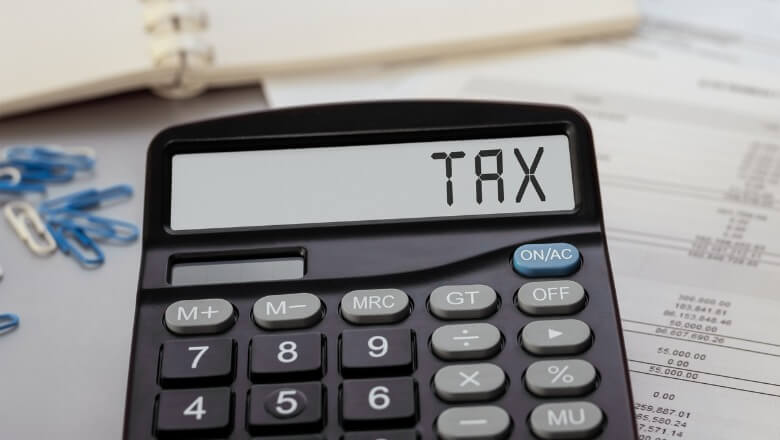2025 Tax Calculator Table with Examples
The amount you’ll end up paying in income taxes doesn’t have to remain a mystery until you complete your federal return.
With a fundamental understanding of how taxes work and some basic information about your household, you may be able to estimate what your tax liability or refund will be. And with that knowledge, you can better plan your finances for 2026 and 2027.
Read on for a look at what your 2026 taxes might look like, and how your income, filing status, and other factors can impact your bottom line.
Table of Contents
Key Points
• To estimate 2026 federal income tax, calculate gross income, determine AGI, subtract deductions, apply tax rates, and use tax credits.
• Standard deductions for 2026 are $16,100 for single, $24,150 for head of household, and $32,200 for married filing jointly.
• Tax brackets for 2026 range from 10% to 37%, with higher rates applying to higher income levels.
• Adjustments to gross income include alimony, student loan interest, and health insurance premiums for the self-employed.
• Tax credits reduce tax liability dollar-for-dollar, affecting the final tax owed or refund amount.
What Is an Income Tax Calculator?
A federal tax calculator for 2026 can help you estimate the federal tax you may owe on the income you earn this year. It isn’t meant to replace the tax service or software you usually use to complete your return. But it could help you plan ahead and make informed choices as you prepare for a potential tax bill, or refund, when you file in 2027.
Historical Tax Rates, Compared
Most people think taxes are too high now, but they could be — and have been — much higher. In 2026, the top tax rate is 37% for individuals whose taxable income is over $640,600 ($768,700 for married couples filing jointly). But in 1944, the highest rate — for anyone who made over $200,000 — was 94%. It wasn’t until 1987 that the top rate dropped below 40%.
The current rates, dictated by the Tax Cuts and Jobs Act of 2017, were made permanent in 2025. The tax code, officially called the Internal Revenue Code, is interpreted and implemented by the U.S. Treasury Department and the Internal Revenue Service (IRS), but tax laws are written by Congress.
How Is the Tax Rate Decided?
There are seven federal income tax rates: 10%, 12%, 22%, 24%, 32%, 35%, and 37%. The more taxable income you have, the more you can expect to pay.
That’s because in the U.S., income tax rates are graduated, which means each of these progressively higher tax rates is assigned to a specific income range, rather than a household’s entire taxable income. Each time your taxable income reaches a new level, you’ll pay a higher rate, but only on the portion that’s in that range.
The ranges, or brackets, differ depending on a taxpayer’s filing status (single, married filing jointly, married filing separately, or head of household), as seen in the table below.
Income Tax Rates and Brackets for 2026 Tax Year
| Tax Rate | Single Filers | Married Filing Jointly | Married Filing Separately | Head of Household |
| 10% | $0 to $12,400 | $0 to $24,800 | $0 to $12,400 | $0 to $17,700 |
| 12% | $12,401 to $50,400 | $24,801 to $100,800 | $12,401 to $50,400 | $17,701 to $67,450 |
| 22% | $50,401 to $105,700 | $100,801 to $211,400 | $50,401 to $105,700 | $67,451 to $105,700 |
| 24% | $105,701 to $201,775 | $211,401 to $403,550 | $105,701 to $201,775 | $105,701 to $201,775 |
| 32% | $201,776 to $256,225 | $403,551 to $512,450 | $201,776 to $256,225 | $201,776 to $256,200 |
| 35% | $256,226 to $640,600 | $512,451 to $768,700 | $256,226 to $384,350 | $256,201 to $640,600 |
| 37% | $640,601 or more | $768,701 or more | $384,351 or more | $640,601 or more |
If you’re a single filer with $60,000 in taxable income in 2026, for example, you won’t pay your highest tax rate (22%) on that entire amount. You’ll pay 10% on up to $12,400 of your taxable income; 12% on the amount between $12,401 to $50,400 ($38,000); and 22% on the amount between $50,401 and your taxable income of $60,000 ($9,600).
Recommended: How Much Do You Have to Make to File Taxes?
How to Calculate Federal Taxes in 2026-2027
Determining your income tax each year is, of course, much more complicated than simply applying the various tax rates to the money you’ve earned.
Depending on the complexity of your return, it may take several calculations to come up with the final amount you owe — or what you’ve overpaid and can expect to be refunded. Whether you’re filing taxes for the first time or you’ve been paying income taxes for years, here’s a quick summary of the basic steps that may go into figuring out your federal taxes in 2026-27:
1. Calculate Your Gross Income
This is the total of all the money you made for the year. Think income from your job, including tips; business income; dividend and interest income; etc.
2. Determine Your Adjusted Gross Income (AGI)
Once you know your gross income, you can subtract certain adjustments, such as alimony payments, student loan interest, health insurance premiums (if you’re self-employed), some retirement contributions, and more to determine your AGI.
3. Subtract Applicable Deductions
A tax deduction is an amount you can subtract from your AGI to further reduce your income and lower your tax. You can either choose to list, or itemize, all the tax deductions that apply to you, or you can take the standard deduction. Most taxpayers go with the standard deduction, which for tax year 2026 is:
• $16,100 for single filers and married individuals filing separately;
• $24,150 for heads of households; and
• $32,200 for married couples who file jointly.
However, you may want to run the numbers to see if it makes sense to go with itemized deductions. Some common deductions that must be itemized but could help further reduce your tax burden include mortgage interest, charitable contributions, and medical and dental expenses. But there are many more options to choose from.
4. Apply the Appropriate Tax Rates from the Table
Once you’ve calculated your taxable income, you can apply the 2026 tax rates. Remember, your entire taxable income won’t be taxed at the same rate; the tax rate goes up at various levels, or brackets.
5. Use Any Applicable Tax Credits
Unlike tax deductions, which reduce how much of your income is subject to taxes, tax credits directly reduce dollar-for-dollar the amount of tax you owe. When you’re preparing for tax season, your tax professional or tax software can help you find your applicable tax credits.
Some common credits include the Child Tax Credit, education credits, the Saver’s Credit for retirement savings contributions, and the premium tax credit that helps eligible individuals and families cover the premiums for their health insurance purchased through the federal marketplace.
6. Don’t Forget What You’ve Already Paid
Keep in mind that you’ve likely had money withheld from your paychecks throughout the year to put toward your federal income tax. Or, if you’re self-employed, you may have been making quarterly estimated tax payments. Once you know what you owe (after applying tax credits), you can subtract what you’ve already paid to get a final tax amount. If the number is positive, you can expect to owe the IRS. If it’s negative, and your calculations are correct, you can expect to get a refund.
Track your credit score with SoFi
Check your credit score for free. Sign up and get $10.*
and get $10 in rewards points on us.
RL24-1993217-B
How Much Does the Average American Pay in Taxes?
A Tax Foundation analysis of the most recent available data from the IRS (2022) found that the average tax rate for all U.S. taxpayers was 14.5%, and the average amount of income taxes paid was $13,890. The highest-earning Americans paid an effective average tax rate of 26%, while the bottom 50% paid 3.74% of their income to the IRS.
Of course, there are other types of taxes you may also have to pay, including sales tax, property tax, state and local taxes, estate tax, and more. And this means taxes can eat up a hefty portion of your hard-earned money.
Need help managing your finances? A money tracker can help you keep tabs on where your money is coming and going.
Example Tax Scenarios
Your federal income tax bill each year will depend on several factors, including your gross income, your filing status, the deductions and credits you can use to lower the amount you owe, and what you’ve already paid during the year. Here are two basic examples of how taxes might be calculated in 2026 for a single filer with a salary of $80,000 and a married couple with a gross household income of $120,000.
Joe, the Single Filer
Joe has a salary of $80,000 in 2026, so his gross income is $80,000.
He decides to go with the standard deduction in 2026, which is $16,100 for a single filer. This brings his taxable income to $63,900.
Joe then uses the applicable tax brackets.
• The first layer of Joe’s taxable income, up to $12,400, is taxed at 10%, which comes to $1,240.
• The next layer of Joe’s taxable income, from $12,401 to $50,400, is taxed at 12%, which comes to $4,560.
• The next layer of Joe’s taxable income, from $50,401 to $63,900 is taxed at 22%, which comes to $2,970.
Joe would have a total federal income tax of $8,770.
Joe finds a couple of credits he can apply that take another $1,000 off of his tax bill. And he figures out that he will have paid $6,000 in federal income tax withholding for the year.
Joe estimates that he’ll owe $1,770 when he files his taxes 2027, and he’s building that into his budget so that he’s prepared when it’s time to pay. (Tip: An online budget planner can take the guesswork out of budgeting.)
Mary and Sam, Married Filing Jointly
Mary and Sam’s combined salaries in 2026 equal $120,000, so their gross income is $120,000.
They don’t have any kids yet, and they haven’t yet purchased a house. So, they decide to use the standard deduction in 2026, which is $32,200. This brings their taxable income to $87,800.
According to the applicable tax brackets:
• The first layer of their taxable income, up to $24,800, is taxed at 10%, which comes to $2,480.
• The next layer of their taxable income, from $24,801 to $87,800, is taxed at 12%, which comes to $7,560.
Mary and Sam would have a total federal income tax of $10,040.
Mary and Sam think they’re eligible for $2,000 in tax credits that they can take off their tax bill. And between them they will have paid $10,000 in federal withholding in 2026.
Mary and Sam estimate that they’ll get a refund of $1,960 when they file their 2026 tax return, and they plan to put that refund toward a down payment on a house in 2027.
Recommended: What Tax Bracket Am I In?
How Federal Taxes Impact You
The U.S. tax system is the federal government’s single largest source of revenue, and compliance with federal tax laws is mandatory. The money taxes bring in is meant to finance various public services, including veterans’ benefits, Social Security, health programs, national defense, education, transportation, and more.
That said, there’s a popular quote from an old Morgan Stanley ad that says: “You must pay taxes. But there’s no law that says you gotta leave a tip.”
For high earners, especially, taxes may be one of the most significant expenses they encounter each year and over their lifetime. But all taxpayers can benefit from understanding how taxes work and from the type of proactive planning that can help them legally hold on to more of their money. Staying on top of any changes can also help you avoid common tax filing mistakes, as many deductions, credits, and income thresholds are adjusted annually for inflation.
The Takeaway
If you have an idea of how much you’ll bring in from various income streams this year, and you’re aware of some of the basic deductions and credits that might reduce the amount you’ll owe, you can use the 2026 brackets to calculate a pretty good tax estimate.
Whether you expect to pay when you file your return or you think you’ll get a refund, calculating your tax bill in advance can help you budget appropriately. And you may even find some additional savings in 2026 and beyond.
Take control of your finances with SoFi. With our financial insights and credit score monitoring tools, you can view all of your accounts in one convenient dashboard. From there, you can see your various balances, spending breakdowns, and credit score. Plus you can easily set up budgets and discover valuable financial insights — all at no cost.
FAQ
What will the tax brackets be for 2026?
The IRS has already published the 2026 tax rate table for single filers, married couples filing jointly, married couples filing separately, and heads of household. Each bracket has been adjusted slightly to reflect inflation.
How can you calculate estimated tax payments for 2026?
To calculate your estimated tax, you must figure your expected adjusted gross income, taxable income, deductions, and credits for the year.
Will tax returns be bigger in 2026?
Some taxpayers may qualify for a larger refund on their 2026 return (due in April 2027), thanks to inflation-related adjustments to the tax brackets and standard deduction amounts. Changes to the tax laws could also impact 2027 returns (due in April 2028), but it’s harder to predict what tax bills will look like at that time.
How much is the standard deduction for 2026?
The standard deduction amount depends on your filing status. In 2026, the standard deduction will be $16,100 for single filers and married individuals filing separately; $24,150 for heads of households; and $32,200 for married couples who file jointly.
What is the tax offset for 2026?
A taxpayer’s offset amount can vary depending on the type of debt that is owed.
What is the filing deadline for 2026 federal tax returns?
Federal income tax returns for 2026 are due on Thursday, April 15, 2027.
Photo credit: iStock/Anastasiia Makarevich
SoFi Relay offers users the ability to connect both SoFi accounts and external accounts using Plaid, Inc.’s service. When you use the service to connect an account, you authorize SoFi to obtain account information from any external accounts as set forth in SoFi’s Terms of Use. Based on your consent SoFi will also automatically provide some financial data received from the credit bureau for your visibility, without the need of you connecting additional accounts. SoFi assumes no responsibility for the timeliness, accuracy, deletion, non-delivery or failure to store any user data, loss of user data, communications, or personalization settings. You shall confirm the accuracy of Plaid data through sources independent of SoFi. The credit score is a VantageScore® based on TransUnion® (the “Processing Agent”) data.
Tax Information: This article provides general background information only and is not intended to serve as legal or tax advice or as a substitute for legal counsel. You should consult your own attorney and/or tax advisor if you have a question requiring legal or tax advice.
Non affiliation: SoFi isn’t affiliated with any of the companies highlighted in this article.
Third-Party Brand Mentions: No brands, products, or companies mentioned are affiliated with SoFi, nor do they endorse or sponsor this article. Third-party trademarks referenced herein are property of their respective owners.
Financial Tips & Strategies: The tips provided on this website are of a general nature and do not take into account your specific objectives, financial situation, and needs. You should always consider their appropriateness given your own circumstances.
Third Party Trademarks: Certified Financial Planner Board of Standards Center for Financial Planning, Inc. owns and licenses the certification marks CFP®, CERTIFIED FINANCIAL PLANNER®
SORL-Q425-053
Read more



